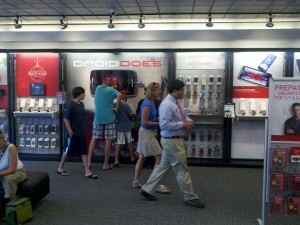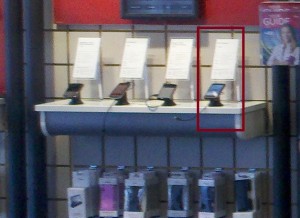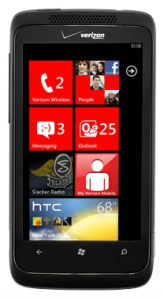Windows Phone 7: It's not one thing, it's Everything
I just visited my local Verizon Wireless store for the third time in two months. Each time I’ve walked in knowing exactly what I wanted, but they have a customer service model that requires everyone to wait in a queue before you can get anything so it’s given me a fair bit of time to kill. I’ve been in the habit of sitting around near the smartphones so I can listen in on the conversations between the sales staff and customers. Now that Verizon carries the iPhone and Windows Phone as well as its traditional Android selection I’ve been curious to hear how things are presented.
While it’s a bad idea to extrapolate the future from a snapshot of current trends, my conclusion is that unless Microsoft can change their approach to retail, Windows Phone 7 is doomed. There are several reasons I think this is the most likely outcome given current trends.
- Market Squeeze: Apple has the high end recognition as the best phone, period. Android is the value or selection play: the one you get when for whatever reason you aren’t getting the best (say you want a value purchase or need a different form factor or better battery life). These are the two traditional market segments. Everything else is generally relegated to a niche.
- Pepsi Challenge Failure: When you walk up and try a WP7, it feels completely different. Unfortunately that means you’re not sure if it’s going to do what you want because there aren’t any comparables (you’re not just buying Android, but a bigger screen or a thinner case or whatever) and it doesn’t have the immediate obviousness of the iPhone.
- No Presence: There’s nothing in the store that draws attention to it. Not one display, no branding, and no segregation from other products. This sends the message that this phone is the odd man out, which consumers are adept at translating to mean inferior.
Between a Rock and a Hard Place
In my local Verizon store there are two clear display areas for smart phones: One wall with 14 Android variations of every conceivable form factor and, on the far opposite wall, a 10 foot display for the iPhone. These two displays pretty well typify their respective brand positions.
Apple has no doubt made sure that their display is all about Apple. There’s no other branding within feet of it, not a Verizon logo in sight. It’s sparse, clean, and wouldn’t look out of place in an Apple Store. I can’t recall in my time over there ever seeing anyone standing in that part of the store but I know they moved a lot of iPhones. My guess would be that people walk in and say “I want an iPhone” and then it’s just a question of what size & they’re out the door.
On the other wall were all the other phones - 14 Android phones and one Windows Phone 7. This wall is all about Verizon. Verizon even eschews the term Android in favor of their marketing term Droid whenever possible. Here the sales staff help you select based primarily on screen size, battery life, and keyboard type. They’ve got a phone in every slot of that matrix, and that’s how they’re sold.
Now, in this sea of phones can you spot the one Windows Phone 7 device Verizon carries? Look real close. Go ahead - you can click on the graphic to see it full size.
Here’s another shot blown way up so you can find it. There it is! The fourth phone in a set with three other Android phones. Now in case you’re wondering the Android phones keep going all the way across the photo above.
So here’s what a customer sees: The safe choice of the market leading iPhone, and the probably safe choice of picking exactly the Android phone that hits their sweet spot of size, cost, weight, and form factor. These are familiar alternative positions for consumers, and in this context the Windows Phone doesn’t fit. With just one option, but being positioned over in the bargain rack it comes off as an also-ran meant for someone else but not me.
Take the Pepsi Challenge
In the 1980’s Pepsi made a major marketing campaign out of blind taste testing their product against the market leader, Coke. The results were decidedly in their favor: most people preferred Pepsi. However, it turns out that the way the test was done (using small cups with very small amounts of the beverage to taste) substantially skewed the results: When just having a few sips, people preferred Pepsi. Ask them again when they’re at the end of a can and they’d opt for Coke.
When you’re in a store picking a phone you’re doing a sip test: a quick hold in your hand (but the phone’s probably tethered so you don’t get the real experience of holding it anyway) and you flip through the options quickly and check the spec sheet. Does it look right, is the display cool, do you think you can get it to do what you want.
Unfortunately, Windows Phone 7 seems to be the Coke in this scenario: when you pick it up it’s different. It’s not at all clear if it does all the things you want because it’s neither the established best in market (iPhone) which can be simply assumed to do it all or the Android options which can be demonstrated pretty quickly and make sense. You need to spend some time with it to get comfortable that it really can do everything you want and it’s really better. In that way it’s something like the Ribbon in Office - it’s a go big or go home play that takes time to decide on. Unlike Office, there isn’t a big captive audience that will give it the time to get sorted.
Without this ability to be confidently selected on a 5 minute taste in the store a prospective customer has to have be very confident in Windows Phone or have another damn fine reason to take the risk. This gets us to…
What Windows Phone?
Inside the store you see there’s an iPhone, and Verizon Droids. There’s no Microsoft or Windows Phone logos or even the colors and symbols associated with the Phone. Ask the store staff about the one model the have and you’ll get a variety of responses that ultimately come down to they aren’t familiar with the phone, it’s different, and they’re afraid of a return. They know that they don’t get returns on iPhones and a few of the Droids, so you’ll get moved in those directions.
If you’re Verizon this all makes sense. You are making record profits on the backs of both sides of this competition. A third player that at best will cannibalize one of the other two players you already have doesn’t serve any purpose. You have no reason to put marketing energy behind Windows Phone because you invest it in your Droid brand - that’s unique to you. Apple advertises their brand, so nothing you really need to do there.
Microsoft is the only party with something to lose in this game: The hardware vendors all make Android phones as well, and the carriers have other solid options as well. The introductory TV advertising was a start, but it needs to keep going. Not a day goes buy I don’t see two of Apple’s too-hip-for-anyone iPad commercials, and that’s a product that is an absolute runaway success.
Please Save Me from More of This Pretentious DreckThey need to make stores want to have Microsoft displays up in their stores, their sales staff need to have confidence that the product will stay sold. We’re entering a new age of technology where it’s about creating complete products that satisfy a consumer’s needs. Apple’s getting this right. Google’s even dabbling in the hardware side of the business. Microsoft needs to create full, branded solutions or give up in the consumer space.
So where does this leave us?
Microsoft has done a lot to create a product that can be very successful. Windows Phone 7 is stunning in use: Genuinely different than what’s come before and highly optimized fro what we need to do with phones today. There are a reasonable range of hardware options for it, and developers creating a good range of applications. All of this will be irrelevant if it can’t conquer the last mile problem in the stores across America where people make their actual buying choices.
Full Disclosure: I’ve had a Motorola Droid X since soon after its release. When it comes up for replacement I’m not sure where I’ll go next - could be iPhone, Droid, or if they’re still around Windows Phone 7.


